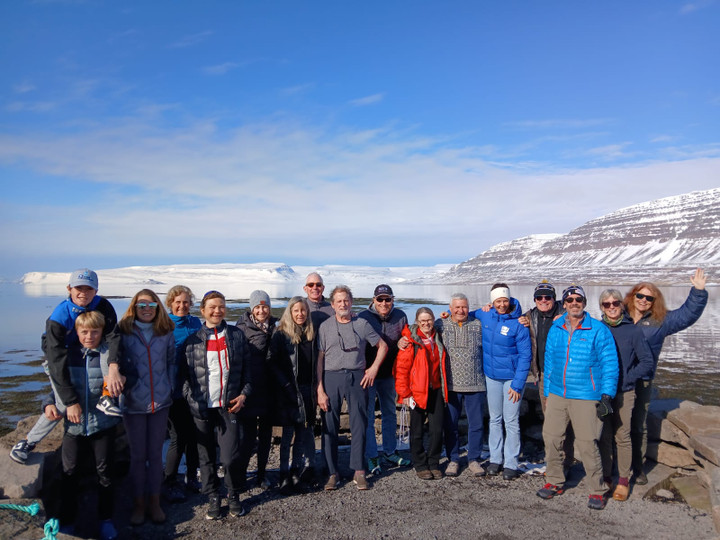Posted by Garrott Kuzzy, Lumi Experiences on Apr 26th 2024
Ísafjörður, Iceland’s unique ski culture
Read this article on the Lumi Experiences site here.
They say that Norwegians are born with skis on their feet. Although Iceland’s reputation for cross-country skiing as a whole doesn’t come close to Scandinavia’s, locals from Ísafjörður – a small, remote town in Iceland’s Westfjords region – have been skiing since the early 1900s. Despite a year-round population of less than 3,000 residents, Ísafjörður has produced the majority of Iceland’s cross country ski Olympians, thanks to a strong community of skiers.

At the turn of the 20th century, an Ísafjörður teacher planted the seeds for cross-country skiing in the community when he introduced his students to the sport. Every student over five was given a pair of skis made from sticks and oilcloth. By 1934, the local skiing association and a ski school were founded, as well as a Ski Week and the Fossavatnshlaup (now the Fossavatnsgangan) the following year. Today the event best know by it’s short name “Fossavatn,” is one of the longest running ski marathons in the world – celebrating its 90th anniversary next year.
In a small town with only three hours of daylight on the shortest day of the year, the annual Fossavatn ski event every April brings the whole community together as it’s waking up to spring – for skiing, cake (lots of cake!), seafood and dancing. Locals who now live elsewhere flock home for this big spring celebration and international skiers make the trek north to extend their ski season into April in Iceland’s stunning Westfjords.

Lumi Experiences travelers were among the international travelers who made the spring pilgrimage to remote Ísafjörður for the Fossavatn Worldloppet Ski Marathon. Yes, it’s possible to fly there through Reykjavik, but strong winds and small airplanes make IFJ Airport one of the world’s least reliable. Instead, Lumi offers guests the opportunity to discover many of Iceland’s waterfalls, geothermal features and cultural sites during the bus ride from Reykjavik to Ísafjörður. Ralph Waldo Emerson’s famous quote about the journey being the destination applies beautifully to the route. The barren, treeless landscape blanketed in snow and stunning fjords make the bus ride itself feel like the destination. Allowing the bus driver to navigate the narrow, often icy roads sure beats risking it in a rental car. Our tour guide Alex kept the group entertained with his Icelandic insights and dry, British sense of humor throughout the journey (“of course, you could fly, but why?”)
Little Ísafjörður, who’s location on a small peninsula protecting the harbor in the middle of a fjord, proved that sometimes the destination is the destination. The small fishing village filled with skiers in town last weekend for the Fossavatn. Weather forecasts predicted inclement weather, wind and rain for much of the week. Fortunately, the weather itself was much better than the forecast. From town, you can see a panoramic view of the entire race course across the bowl created by the glacial valley. Mid-April on the edge of the Arctic Circle at 66 degrees latitude offers about 18 hours of sunlight each day. This means that Thursday’s 25 km “night race” starting at 5:00 pm, required no headlamp. In fact, the last finisher, Preetam Singh from India, crossed the line after 10:00 pm and still had daylight as he skied across the finish line.
Saturday’s 50 km classic marathon, the main event of the weekend, took place in almost all types of weather: rain, sun, clouds, mist, but most of all: wind. I’m not sure how it’s possible to ski in a straight line for 500 meters and have a head wind, side wind and tailwind, but that’s what happened during the race. The Fossavatn 50 km has less than 300 participants and finishes at the same place where it starts, so it’s one of the easier Worldloppet events – logistically, at least. The trails themselves, with lots of climbing and descending, are certainly not easy, but most of the hills are gradual enough that they can be skied using classic striding technique. The tops of the climbs also reward skiers with stunning views to the fjord below and snowy peaks above. Fortunately, the last 6 km of the race are all downhill, so I crossed the line feeling surprisingly fresh.
The highlights of the Fossavatn were definitely the post-race events. Immediately after the race, the organizers host a Cake Buffet. Literally. Ísafjörður locals bake hundreds of cakes that are served to participants during the awards ceremony. Everything from Iceland’s famous Happy Marriage Cake, to homemade birthday cakes, brownies and muffins. Yum! But the race organizers warned me to save some appetite for the evening’s Seafood Banquet. What?! Of course, Iceland is known for its seafood and the banquet was perhaps the highlight of the trip. The banquet hall certainly had more than the number of participants registered for the event, as Iceland’s whole ski community and Ísafjörður’s local community were all in attendance that evening, dressed like they were going to a wedding – perhaps the best way to imagine the event, that included a live band and finished after 1:00 am. What a party!

Returning to Reykjavik on Sunday after a wonderful week of skiing, we stopped at a geothermal pool to soak sore muscles in the warm waters en route. After raising a glass to the week and one last meal together, several guests stayed up to catch a stunning glimpse of the Northern Lights from the rooftop terrace of our hotel. A memorable end to an incredible week in Iceland. I’m already looking forward to next year.
If you’d like to experience this big spring celebration on skis in Iceland next year, we were able to add some additional space on the 2025 Iceland-Fossavatn trip. Reach out to save your spot while there’s still room and save $200 per person before April 30.
I hope to see you on the trail in 2025,
Garrott Kuzzy


